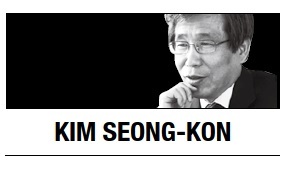[Kim Seong-kon] Possible side effects of the anticorruption law
By 김케빈도현Published : Sept. 27, 2016 - 16:28
 As the anti-graft law, which is commonly referred as the Kim Young-ran law, is enforced as of today, millions of Koreans are worried and even scared of the newly implemented law that will affect their lives in one way or another. Not only government officials but also professors, teachers and journalists are being extremely cautious in order not to violate the new law and inadvertently end up being a criminal. In fact, the fear escalates exponentially when it’s realized that the newly enforced law may ruin one’s career.
As the anti-graft law, which is commonly referred as the Kim Young-ran law, is enforced as of today, millions of Koreans are worried and even scared of the newly implemented law that will affect their lives in one way or another. Not only government officials but also professors, teachers and journalists are being extremely cautious in order not to violate the new law and inadvertently end up being a criminal. In fact, the fear escalates exponentially when it’s realized that the newly enforced law may ruin one’s career. As for me, I am all for the new anticorruption law. I have always lamented the chronic disease of corruption and graft that is still rampant in our society. For example, I do hope that the new law will root out “chonji” -- bribes some teachers have been customarily taking from their students’ parents. I also strongly hope that the outrageous restaurant menu prices will go down to under 30,000 won. At dinnertime in a Japanese restaurant in Samseong-dong, the cheapest meal is about 120,000 won ($108) per person. When working overtime in the evening, my staff cannot have a decent meal with the 7,000 won provided according to the government rules and regulations. Even a cup of coffee costs 5,000 won these days. Thus, they have to substitute dinner with bread they have purchased at Paris Baguette. Now restaurants are hurriedly adjusting their current meal prices, which are nothing more than highway robbery.
Nevertheless, experts argue that the law entails some serious problems and side effects. For example, bribery will go underground from now on and thus it may be more difficult to detect. Indeed, when the Prohibition was enforced in the States, alcoholic beverages did not disappear; the underground bootlegging industry became prosperous instead. Another problem is the so-called “ranparazzi” who, for money, clandestinely take photos of public figures dining at restaurants. There are even hagwons here that train ranparazzi. This phenomenon will surely turn Korean society into a distrustful one.
People also fear that the law is likely to incriminate innocent people who make a mistake or who are forced to bend the law under special circumstances. For example, suppose foreign guests you had invited to an Italian restaurant where the cost of meal is slightly less than 30,000 won, abruptly ordered a bottle of wine. Would it be a crime to treat foreign guests with wine that usually goes with Italian cuisine? Would you have to say, “No!” to the foreign VIP guests? Or should you pay for it on your own expense?
Recently, I met professors who were worried about the side effects of the anti-graft law. “We have so many Ph.D. candidates in our Department, who are waiting for the oral or dissertation defense,” they croaked. “The problem is that from now on, we can neither give the outside reader travel expenses nor treat him to lunch or dinner after the oral or defense because it can be seen as bribery. People agree that it may be necessary to forbid you to take any gift from someone who is related to your job. However, they complain that if it is personal and not job-related at all, who has the right to set the limit?
Indeed, many professors are not pleased with the law. There are famous, distinguished professors who deserve special treatment when we invite them for a special lecture. According to the law, however, everybody should be given a fixed small amount of honorarium. But how could you treat a Nobel laureate and an unknown junior professor equally?
Reporters, too, complain that from now on, they cannot review performing arts because they will unwittingly break the law if they accept the invitation ticket, the price of which usually far exceeds 50,000 won. People point out that the aim of the law is to forbid bribery, not to forbid professors or reporters to receive proper fee for their intellectual labor.
It is also controversial that according to the law, you should report your spouse to the authorities if he or she has taken something that can be considered a bribe. In countries such as the United States, you are not required to report your spouse to the authorities because such an act would likely break up a marriage. Yet the law does not seem to take it into account.
There is a maxim in Korea: “Do not burn your house in order to catch a bedbug.” If you want to eliminate bedbugs, you should aim well and spray insecticide in a surgical strike. Setting your house on fire is neither your intention nor is it wise. I heartily welcome the long-awaited anti-graft law. I just want to see it settled and enforced properly. Undoubtedly, we need to revise the law so that it can be enforced reasonably and not indiscriminately victimize innocent people. Only then will the law be welcomed and appreciated.
By Kim Seong-kon






![[Weekender] How DDP emerged as an icon of Seoul](http://res.heraldm.com/phpwas/restmb_idxmake.php?idx=644&simg=/content/image/2024/04/25/20240425050915_0.jpg&u=)



![[KH Explains] No more 'Michael' at Kakao Games](http://res.heraldm.com/phpwas/restmb_idxmake.php?idx=644&simg=/content/image/2024/04/28/20240428050183_0.jpg&u=20240428180321)






![[Herald Interview] Mistakes turn into blessings in street performance, director says](http://res.heraldm.com/phpwas/restmb_idxmake.php?idx=652&simg=/content/image/2024/04/28/20240428050150_0.jpg&u=20240428174656)
